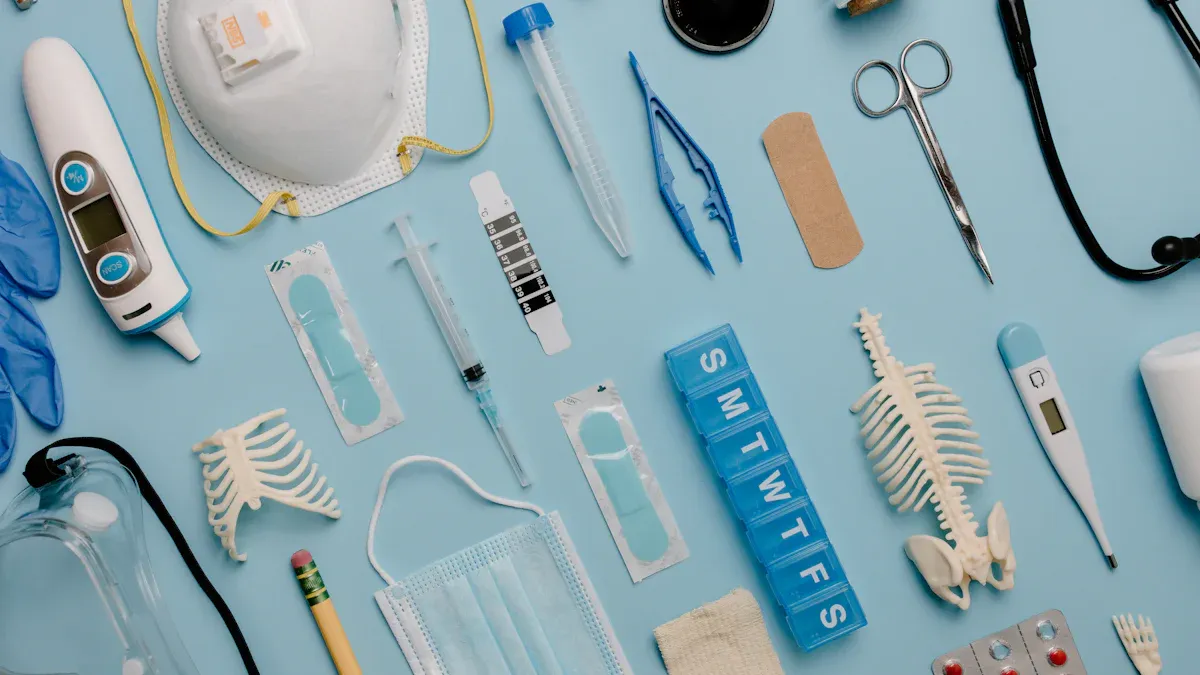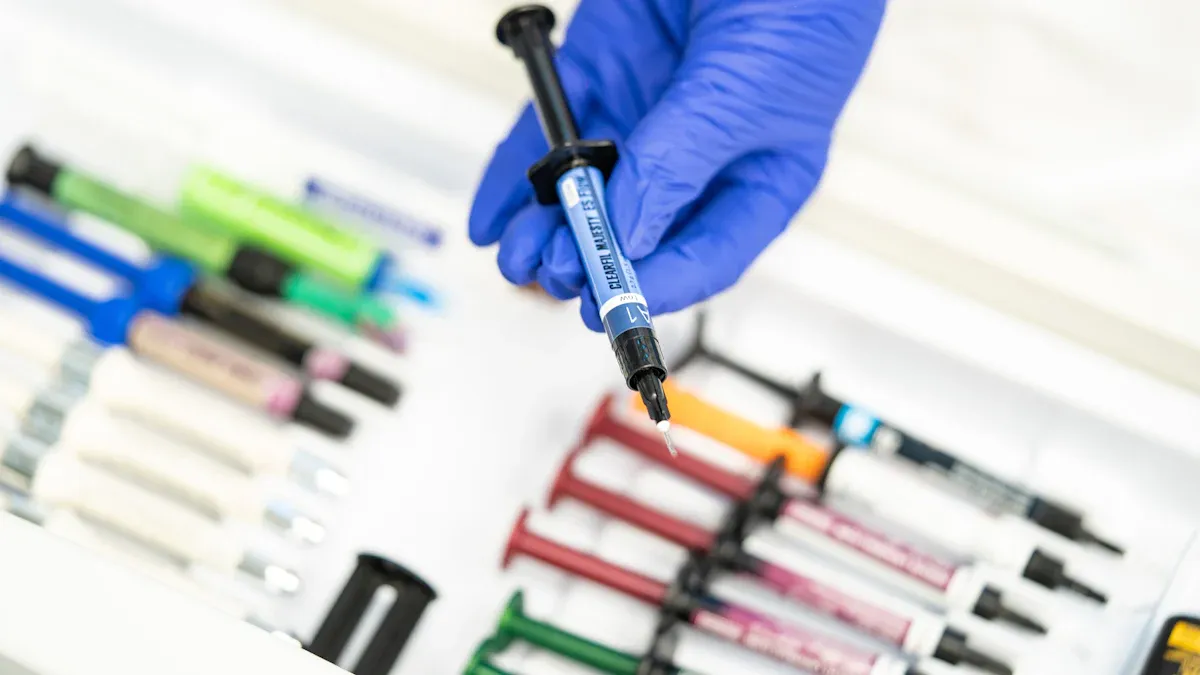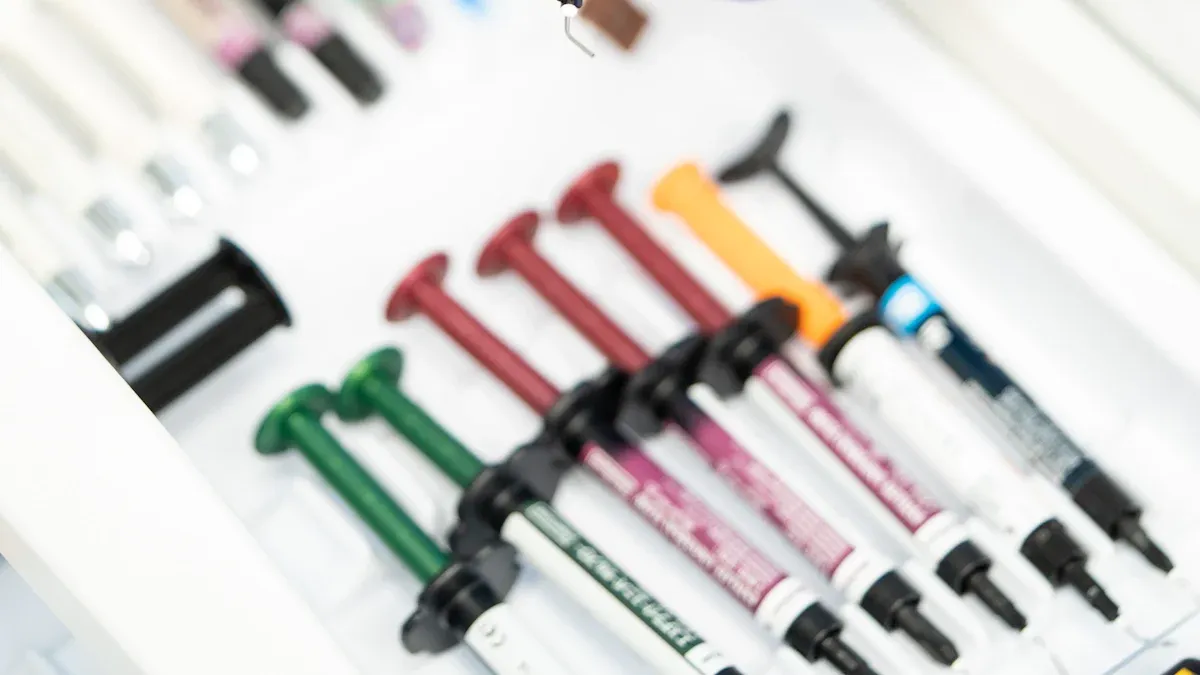What Are the Benefits of PET Heat Shrink Tubing in Disposable Medical Equipment

PET heat shrink tubing is very strong and safe. It works well in disposable medical equipment. Many companies use PET for lab and medical tools. This is because it meets tough FDA, CE, and ISO 10993 rules. PET heat shrink tubing covers wires, joints, and small parts. It shrinks tightly to make a safe, strong layer. This material does not get damaged by chemicals or cleaning. It keeps equipment safe for patients and helps devices work better. The table below shows PET heat shrink tubing is better than other materials. It is stronger, handles heat better, and is safer and more reliable.
Feature | PET Heat Shrink Tubing | Alternative Materials |
|---|---|---|
Mechanical Strength | High, keeps shape after cleaning | Usually lower, not as strong |
Thermal Stability | Handles up to 150°C, good for cleaning | Changes, often not as heat safe |
Chemical Resistance | Safe from chemicals, oils, and cleaners | Not as safe, can break down |
Biocompatibility | Meets ISO 10993, USP Class VI rules | Often does not meet all safety rules |
Sterilization Durability | Works well after many cleanings | May break or lose strength |
Dielectric Strength | High (>4,000 V/mil), stops electric problems | Changes, often not as good |
Risk of Contamination | Low, fits tight and material is safe | Higher, especially with tape or by hand |
Ease of Application | Machine use, always fits well | By hand, not always the same |
Cost-Effectiveness | Costs more at first but saves money later | Cheaper at first but costs more over time |
PET heat shrink tubing gives high performance and safety. It is needed for lab and medical equipment. PET Heat Shrink for Disposable Medical Equipment helps devices work well and keeps patients safe.
Key Takeaways
PET heat shrink tubing is tough and safe. It keeps medical tools safe from harm and germs. It wraps tightly around parts. This helps devices work well and last longer. The tubing can handle heat, chemicals, and cleaning. It does not get weak after many uses. PET tubing follows strict medical safety rules. This makes it safe for patients. Using PET tubing helps companies make good medical devices. These devices are strong and work well.
What Is PET Heat Shrink Tubing

Material Properties
PET heat shrink tubing is made from a strong, clear plastic called polyethylene terephthalate. This plastic makes the tubing tough and helps it keep its shape. PET heat shrink tubing does not get damaged by chemicals or heat. It can be cleaned many times and still stay strong. The tubing meets strict rules for medical use, like ISO 10993 and USP Class VI. This means it is safe for medical devices.
PET heat shrink tubing bends easily and is simple to use. That is why many companies that make medical devices pick it.
The tubing comes in different sizes and thicknesses. It can be clear, black, white, or other colors if needed. The table below lists some important details:
Characteristic | Specification / Description |
|---|---|
Diameter | 0.006" to 0.5" (±0.001" to ±5%) |
Wall Thickness | 0.0001" to 0.004" (±0.0001" to ±20%) |
Temperature Range | -196°C to 135°C (long-term), up to 200°C (short-term) |
Melting Point | 235°C |
Electrical Properties | Dielectric strength > 4,000 V/mil; Dielectric constant 3.3 |
Sterilization Methods | Ethylene oxide, gamma radiation, autoclaving |
Biocompatibility | ISO 10993 compliant |
Shrinkage Behavior | Shrink ratio about 1.1:1; Shrinking temperature 70°C to 190°C (typical 150°C) |
PET heat shrink tubing does not break down when cleaned with strong cleaners. It keeps most of its strength even after being cleaned 50 times with hydrogen peroxide. This makes it last longer than other heat shrink tubing.
How It Works
PET heat shrink tubing starts out bigger. When you heat it, the tubing gets smaller and wraps tightly around wires or parts. This makes a safe and strong cover. The tubing fits closely to each part, which helps stop germs and damage.
The tubing can shrink to fit tricky shapes. This is important for things like catheters, electrical parts, and keeping things safe. PET heat shrink tubing can also help mark tubes or make braided parts stronger. Using it in these ways makes devices safer and work better.
PET heat shrink tubing is used in many disposable medical tools. It gives protection, insulation, and helps devices last longer. The tubing is easy to use and helps workers make fewer mistakes. PET heat shrink tubing stays strong with heat, radiation, and chemicals, so it works well for many jobs.
Key Benefits of PET Heat Shrink Tubing
Durability and Protection
PET heat shrink tubing is very tough and protects well in hospitals. It helps keep lab and medical tools safe from damage. Doctors and nurses use these tools many times each day. The tubing does not wear out easily, so it keeps wires and small parts safe from rubbing and bumps. This helps stop problems and keeps patients safe.
Many single-use medical tools, like catheters and guidewires, use PET heat shrink tubing. The tubing makes the surface smooth, so it slides in easier. This helps patients feel better and stops harm to their bodies. PET heat shrink tubing keeps its shape even when it touches body fluids or gets cleaned a lot. Surgical tools use this tubing because it gives a good grip and does not get ruined when washed.
PET heat shrink tubing helps medical tools last longer by making a strong shield against damage and bad weather.
The list below shows the main ways it protects:
Stops wearing out from rubbing.
Blocks water and other liquids.
Works in hot and cold places.
Keeps electric parts safe.
Guards against hits and bending.
PET heat shrink tubing helps tools last longer, so it is a good pick for labs and hospitals.
Biocompatibility
Biocompatibility is very important for things used in medicine. PET heat shrink tubing follows strict rules, like ISO 10993 and USP Class VI. These rules show that PET tubing is safe to touch the body. Medical tools should not cause allergies or skin problems. PET heat shrink tubing makes a safe layer to protect both patients and doctors.
Catheters, guidewires, and test tools all use PET heat shrink tubing because it is safe for the body. The tubing fits tightly, so dust, water, and dirt cannot get in. This helps keep the tools clean and meets FDA and ISO 13485 rules.
PET heat shrink tubing’s safety means lab and medical tools meet top safety needs.
Chemical and Sterilization Resistance
Medical tools need to be cleaned and sterilized often. PET heat shrink tubing is very good at standing up to strong cleaners and heat. Hospitals use powerful chemicals to clean tools. PET tubing does not get weak or break after being cleaned many times.
Tests show PET heat shrink tubing keeps 88% of its strength after 50 cleanings with hydrogen peroxide. The tubing stays clear and strong after gamma or e-beam radiation. High heat and steam from autoclaving do not change the tubing’s shape or how it works. The table below shows these facts:
Evidence Type | Supporting Result |
|---|---|
Heat-based Sterilization | PET heat shrink tubing stays strong and keeps its shape after autoclaving. |
Chemical Resistance | Keeps 88% of its strength after 50 hydrogen peroxide cleanings. |
Radiation Sterilization | Stays clear and works well after gamma or e-beam radiation. |
Biocompatibility | Follows ISO 10993 and USP Class VI rules. |
Dimensional Stability | Keeps its shape for up to 18 months when sterilized. |
PET heat shrink tubing is very thin and keeps its shape, so it is easy to put on tricky shapes. The tubing shrinks at a low heat, so it does not hurt gentle medical parts. These things help make tools faster and keep them high quality in labs and hospitals.
PET heat shrink tubing gives better strength, safety, and steady results in tough medical jobs.
PET Heat Shrink for Disposable Medical Equipment

Precision and Fit
PET heat shrink for disposable medical equipment fits many devices well. The tubing can shrink tightly around wires and connectors. It also works on parts with odd shapes. Workers use calipers to measure the outside of the device. This helps them pick the right size tubing. The tubing is about 25% bigger than the largest part. This makes it easy to slide on before shrinking. When heated, the tubing shrinks to match the shape. The gap left is 15% or less. This close fit stops parts from moving and keeps things safe.
The shrink ratio is often 2:1 or 3:1. This lets the tubing wrap around shapes that are not even. Some types can shrink their size by up to 70%. This means PET heat shrink can cover many designs. The table below shows key measurements for how well it fits:
Measurement/Property | Details/Values |
|---|---|
Shrink Ratio | 2:1 (standard), 3:1 or higher for odd shapes |
Shrinkage Capability | Up to 50-70% diameter reduction |
Diameter Tolerances | ±0.001" for small sizes; ±5% for larger sizes |
Wall Thickness Tolerances | ±0.0001" for thin walls; ±20% for thicker walls |
Visual Inspection | Checks for uniform shrinkage and no air bubbles |
PET heat shrink for disposable medical equipment helps lab tools work well. It makes sure every part fits just right.
Insulation and Safety
PET heat shrink for disposable medical equipment gives strong electrical insulation. This tubing keeps wires and parts safe from electric shocks. It also blocks water and dust. This helps the equipment last longer. The tubing meets tough rules like IEC 60601-1. These rules check for insulation and safety in medical devices. Companies test each batch for how much it shrinks and how strong it is. They also check the finished products before packing them.
The table below lists important certifications for insulation and safety:
Certification | Purpose |
|---|---|
ISO 10993 | Ensures biocompatibility for body-contact applications |
USP Class VI | Confirms biocompatibility for medical use |
UL/CSA 224 | Sets rules for dielectric strength and fire safety |
AMS-DTL-23053 | Guides testing for electrical insulation performance |
PET heat shrink for disposable medical equipment gives better electrical insulation. It helps stop short circuits. It also stands up to chemicals and heat. This makes lab and medical equipment last longer. PET heat shrink tubing is better than other materials for insulation and safety. That is why it is a top pick for medical equipment that needs to be safe and last a long time.
Advantages Over Other Heat Shrink Tubing
Performance Comparison
PET heat shrink tubing is special in making medical devices. It is strong, clear, and stands up to chemicals. PET heat shrink tubing does not stretch or break easily. It has a tensile strength over 107 N/m². The tubing keeps its shape and protects tools when cleaned or used. It also insulates electrical parts very well. PET heat shrink tubing is clear, so workers can see inside. This helps them check if things are clean and put together right.
The table below shows how PET heat shrink tubing compares to other types:
Property | PET Tubing | PVC Tubing | Fluoropolymer Tubing | Elastomer Tubing |
|---|---|---|---|---|
Mechanical Strength | High tensile strength and abrasion resistance | Lower tensile strength, more flexible | Moderate mechanical strength, less abrasion resistant | Moderate tensile strength, high elasticity |
Temperature Range | -196°C to 135°C (short-term 200°C) | Up to 105°C | Up to 260°C | -75°C to 150°C |
Chemical Resistance | Excellent against cleaning agents and solvents | Prone to degradation by harsh chemicals | Exceptional chemical resistance | Good chemical resistance |
Clarity | High, enabling visual inspection | Moderate clarity | Opaque or semi-transparent | Opaque |
Cost | More cost-effective than fluoropolymers | Generally lower cost | Significantly more expensive | Slightly more expensive |
PET heat shrink tubing is tough, clear, and not too costly. It works better than PVC when cleaned with strong chemicals. It is cheaper and clearer than fluoropolymers. PET heat shrink tubing is stronger and easier to see through than elastomers.
Application Efficiency
PET heat shrink tubing helps make medical tools fast and easy. Its walls are very thin, less than 0.1 mm. This lets devices be small but still strong. PET heat shrink tubing shrinks at low heat, so it does not hurt gentle parts. The tubing fits tightly on small or odd shapes. This tight fit helps stop germs and keeps devices from breaking.
PET heat shrink tubing can be cleaned many ways, like with steam, gas, or radiation. It stays strong and keeps its shape after many cleanings. PET heat shrink tubing meets tough rules for safety and cleaning, like ISO 10993 and ISO 17665-1:2023. These things make PET heat shrink tubing a great pick for medical tools.
PET heat shrink tubing helps with:
Safe insulation for electric parts.
Strong shields for small pieces.
Easy checks to see if things are right.
Good results when making lots of tools.
PET heat shrink tubing shrinks at low heat and fits just right. This helps companies make safe and strong medical tools. PET heat shrink tubing is used in many things, like catheters and tiny electronics.
PET heat shrink tubing helps protect medical devices and keeps them safe. It lasts a long time and works well for many uses. Many medical tools use PET because it stays strong after lots of cleaning. The tubing fits tightly, so it helps stop germs from spreading. PET follows strict medical rules and helps devices work the right way. The table below shows how PET does in hospitals:
Performance Metric | Description / Result |
|---|---|
Sterilization Testing | Lasts through 12–18 months of cleaning cycles |
Regulatory Compliance | Follows ISO 10993-1:2018, FDA, and CE Marking rules |
Tensile Strength | Between 500 MPa and 900 MPa |
Picking PET for medical tools helps keep patients safe and makes sure devices work well.
FAQ
What is PET heat shrink tubing used for in medical devices?
PET heat shrink tubing covers wires, joints, and small parts in medical devices. It protects these parts from damage, moisture, and germs. Many companies use it to make sure devices stay safe and work well.
Can PET heat shrink tubing handle sterilization?
Yes. PET heat shrink tubing stays strong after many sterilization cycles. Hospitals use steam, gas, or radiation to clean tools. The tubing keeps its shape and does not break down during these processes.
Is PET heat shrink tubing safe for patients?
PET heat shrink tubing meets strict safety rules like ISO 10993 and USP Class VI. It does not cause allergies or skin problems. Doctors and nurses trust it for use in devices that touch the body.
How does PET heat shrink tubing improve device performance?
PET heat shrink tubing fits tightly around parts. This close fit stops movement and keeps devices working as designed. It also blocks water and dust, which helps devices last longer.
Why do manufacturers prefer PET over other materials?
Manufacturers choose PET because it is strong, clear, and resists chemicals. It costs less than some other materials and meets medical safety standards. PET tubing also makes it easy to check devices for cleanliness and assembly.

